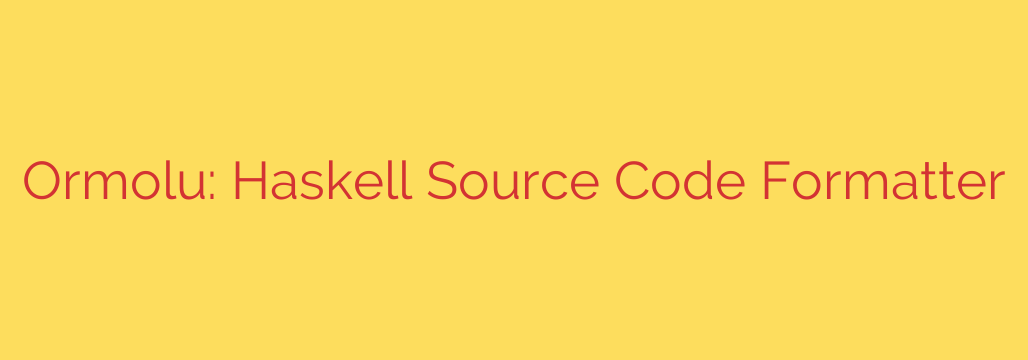
Ormolu: The Definitive Haskell Code Formatter for Consistent Style
In any collaborative software project, maintaining a consistent code style is crucial for readability and maintainability. For Haskell developers, the endless debates over formatting conventions can drain valuable time and energy. This is where a powerful, opinionated tool can make all the difference. Ormolu is a robust code formatter designed to bring consistency and clarity to your Haskell codebase.
By enforcing a single, standardized style, Ormolu eliminates arguments over syntax, allowing your team to focus on what truly matters: building great software.
What is Ormolu?
Ormolu is an opinionated and idempotent source code formatter for the Haskell programming language. Let’s break down what that means for your development workflow:
- Opinionated: Ormolu is not configurable. It implements a single, well-defined formatting style. This is a deliberate design choice to end “bikeshedding”—the trivial arguments over stylistic preferences. Everyone on the team uses the same format, period.
- Idempotent: Running Ormolu on a file multiple times will produce the exact same output after the first run. This property is essential for stability and predictability, especially in automated environments. You can run the formatter confidently without worrying about unexpected changes.
Developed as the official formatter for the Glasgow Haskell Compiler (GHC), Ormolu leverages the compiler’s own parser, ghc-lib-parser. This is a significant advantage, as it ensures that Ormolu can correctly parse and format any Haskell code that GHC can, including code that uses the latest language extensions.
Why Choose Ormolu for Your Haskell Projects?
While other formatters exist, Ormolu has become a standard in the Haskell community for several key reasons.
1. Unwavering Consistency Across Your Codebase
The primary benefit of an opinionated formatter is the universal consistency it enforces. When every module and every function follows the same layout, the code becomes easier to read, review, and understand. New developers can onboard faster because they don’t have to learn a project’s specific style guide; they just learn the Ormolu style. This leads to more efficient code reviews and fewer merge conflicts related to formatting.
2. Powered by the GHC Parser
Ormolu’s use of ghc-lib-parser is its superpower. Unlike tools that use their own parsers, Ormolu is always in sync with the latest Haskell language features and GHC extensions. If your code compiles with a modern GHC, Ormolu can format it. This future-proofs your formatting workflow and prevents syntax errors that can arise when a formatter doesn’t understand new language constructs.
3. Simplified Tooling and Automation
Simplicity is at the core of Ormolu. With no configuration files to manage, setup is incredibly straightforward. This makes it an ideal candidate for integration into your development and CI/CD pipelines. You can easily set up pre-commit hooks or continuous integration checks to automatically enforce correct formatting on every change, ensuring your repository remains clean and consistent at all times.
Getting Started with Ormolu: A Practical Guide
Integrating Ormolu into your workflow is a simple process that pays immediate dividends.
Installation
You can install Ormolu using the standard Haskell build tools, cabal or stack.
For cabal:
cabal install ormolu
For stack:
stack install ormolu
Basic Usage
Once installed, you can run Ormolu directly from your command line. The most common use case is to format files in-place.
ormolu --mode inplace src/MyModule.hs
Ormolu offers three primary modes:
--mode inplace: Modifies the specified files directly.--mode check: Exits with a non-zero status code if any files are not correctly formatted, without changing them. This is perfect for CI checks.--mode stdout: Prints the formatted output to the console, leaving the original file untouched.
Workflow Integration
To get the most out of Ormolu, integrate it directly into your development environment:
- Editor Integration: Most modern text editors and IDEs have plugins for Ormolu, including Visual Studio Code, Emacs, and Vim. These plugins can automatically format your code every time you save a file.
- Pre-Commit Hooks: By adding a pre-commit hook, you can ensure that no unformatted code ever makes it into your version control history.
- Continuous Integration (CI): Add a step in your CI pipeline that runs
ormolu --mode checkon your codebase. This will fail the build if any contributor pushes code that does not adhere to the standard style, maintaining project-wide consistency.
Conclusion: Embrace Consistency and Focus on Logic
Adopting a tool like Ormolu is more than just a stylistic choice; it’s a commitment to a more efficient and professional development process. By automating code formatting, you eliminate a whole class of trivial discussions and manual effort, freeing up cognitive resources to solve complex problems. Its robust, GHC-backed parsing and idempotent nature make it a reliable and future-proof tool for any Haskell developer.
If you want to improve code quality, streamline team collaboration, and bring predictable consistency to your Haskell projects, integrating Ormolu is one of the most impactful changes you can make.
Source: https://www.linuxlinks.com/ormolu-formatter-haskell-source-code/








